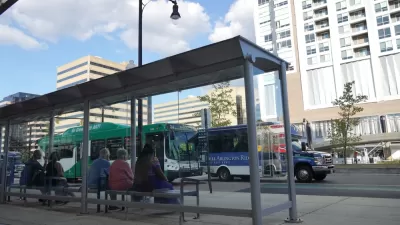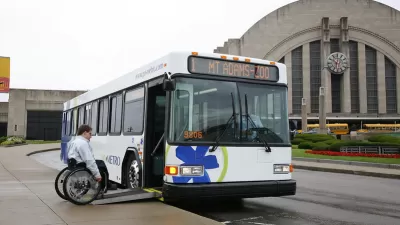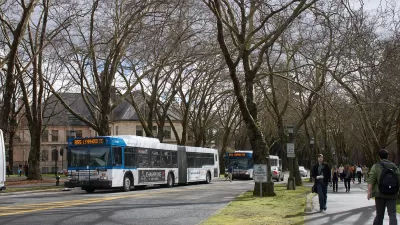With buses as a dominant transport mode for low-income households and "essential workers," free fares would increase access to economic opportunities and free up limited income for cash-strapped commuters.

In an op-ed, Wyatt Gordon and Faith Walker argue for the right to free transit, claiming that "to liberate ourselves from car-dependency, save the planet, and right the wrongs of the past, the bus should be free."
According to Gordon and Walker, "[t]he bus epitomizes a public good: it’s available to all, and society is better off the more people use it." Yet "[u]nlike other public services such as libraries and schools, we expect the bus to pay for itself, largely on the backs of the working poor who take it." In Richmond and other cities like it, the bus is run by a private company.
The bus isn't just useful to those who ride it, say the authors.
[W]hether you even know what GRTC [Greater Richmond Transit Company] stands for or not, you and your lifestyle are transit-reliant. The nurses in your hospital, the clerks at your local supermarket, and the custodians at your office or university represent just a fraction of the folks that rely upon the bus every day to get to work, to pick up their kids from school, and to shop or to seek out healthcare. Without access to fast, frequent, and reliable public transit, much of our economy and our society would come to a screeching halt.
Free transit can help people access jobs and opportunities, get kids to school, and provide crucial access to healthcare. Pointing to how eliminating bus fare can increase equity, the authors point out that "a full 89 percent of GRTC’s riders have household incomes below the state median," while more than half live below the federal poverty line. "If the bus were free like many other public services we all rely upon, Central Virginia’s poorest would get to keep that cash to pay for other essential expenses like housing, food, and healthcare. Going fare free functions as a backdoor boost to wages by allowing those who take transit to work to keep more of their money."
Gordon and Walker conclude that "[i]f our goal is to expand the freedom of our friends, family, coworkers, and neighbors, then eliminating bus fares is one of the most straightforward and equitable actions we can take."
FULL STORY: The Bus Should Be Free

Trump Administration Could Effectively End Housing Voucher Program
Federal officials are eyeing major cuts to the Section 8 program that helps millions of low-income households pay rent.

Planetizen Federal Action Tracker
A weekly monitor of how Trump’s orders and actions are impacting planners and planning in America.

Ken Jennings Launches Transit Web Series
The Jeopardy champ wants you to ride public transit.

Washington Legislature Passes Rent Increase Cap
A bill that caps rent increases at 7 percent plus inflation is headed to the governor’s desk.

From Planning to Action: How LA County Is Rethinking Climate Resilience
Chief Sustainability Officer Rita Kampalath outlines the County’s shift from planning to implementation in its climate resilience efforts, emphasizing cross-departmental coordination, updated recovery strategies, and the need for flexible funding.

New Mexico Aging Department Commits to Helping Seniors Age ‘In Place’ and ‘Autonomously’ in New Draft Plan
As New Mexico’s population of seniors continues to grow, the state’s aging department is proposing expanded initiatives to help seniors maintain their autonomy while also supporting family caregivers.
Urban Design for Planners 1: Software Tools
This six-course series explores essential urban design concepts using open source software and equips planners with the tools they need to participate fully in the urban design process.
Planning for Universal Design
Learn the tools for implementing Universal Design in planning regulations.
Heyer Gruel & Associates PA
Ada County Highway District
Institute for Housing and Urban Development Studies (IHS)
City of Grandview
Harvard GSD Executive Education
Toledo-Lucas County Plan Commissions
Salt Lake City
NYU Wagner Graduate School of Public Service





























